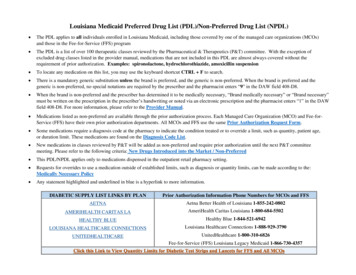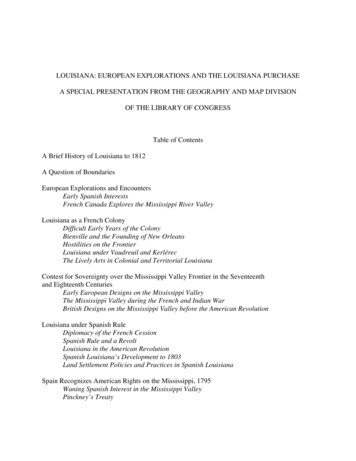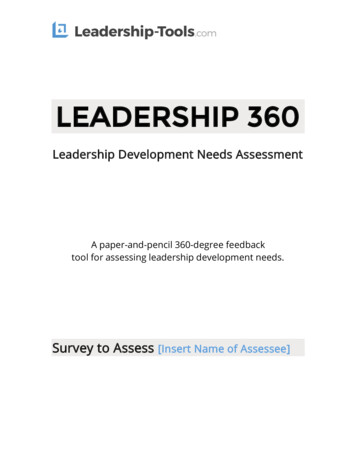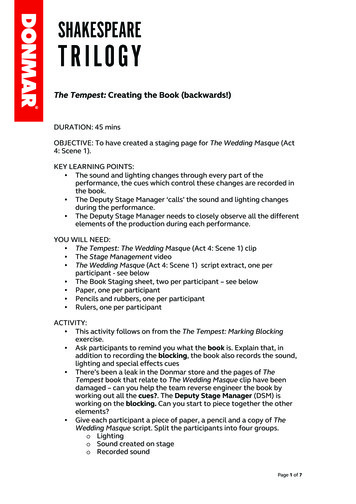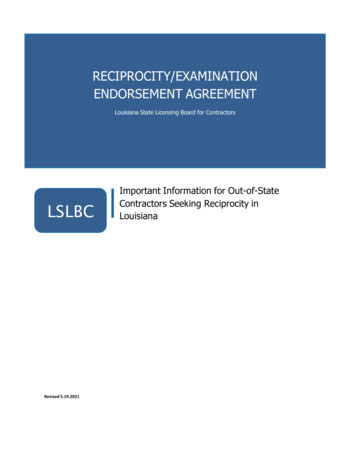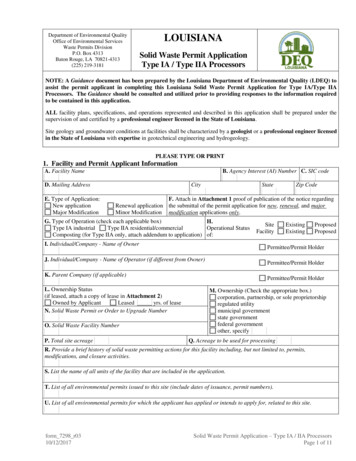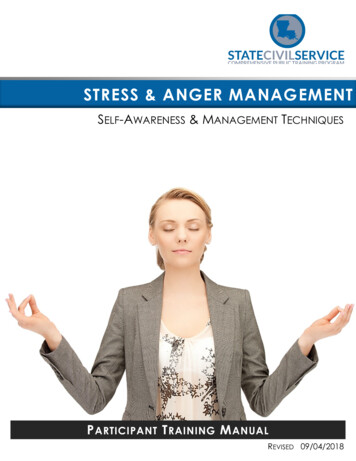
Transcription
STRESS & ANGER MANAGEMENTSELF-AWARENESS & MANAGEMENT TECHNIQUESP ARTICIPANT T RAINING M ANUALREVISED 09/04/2018
STRESS & ANGER MANAGEMENTCOURSE DESCRIPTIONThis course will review key stress and anger management strategies which will improve mental andphysical resilience. This course also introduces conflict management and de-escalation techniques toensure productive outcomes when addressing workplace challenges.TRAINING OBJECTIVESIdentify stress triggers and implement de-escalation strategiesReact to difficult interactions with control and confidenceDemonstrate the ability to manage anger and use it effectivelySYMPTOMS OF STRESS1. What symptoms do you experience when stressed?2. What are your immediate stress management strategies?2
STRESS & ANGER MANAGEMENTSTRESS MANAGEMENTStress Scale Legend3. How do you gauge your stress level?1: I’m creatively and cheerfully engaged inlife.2: I’m relaxed and expect to stay this way.3–5: I can handle stresses and think of positivesolutions to my challenges.6–7: I’m moderately irritable, anxious oroverwhelmed, and stresses feel burdensome.8: My problems seem unsolvable. Many thingsare irritating or upsetting me.9: Help! I’m about to lose it!10: I have chart-topping negative emotions.4. On the 1-10 stress scale, what is your commonstress zone?SYMPTOMS OF STRESS3
STRESS & ANGER MANAGEMENTTHE ABC MODEL TO MANAGING STRESS3 Step Process of the ABC Model1. Identify your beliefs about the actual event Examine your initial reactions2. Challenge your thoughts and beliefsChallenge irrational thoughts by asking the following questions: Am I overreacting? Are my expectations unrealistic? Am I taking things too personally? Am I wrongly blaming myself or others?3. Replace negative thoughts with positive rational thoughts Remove absolutes Use positive self-talkSELF MANAGEMENT STRATEGIESDon’t Take ItPersonally yourself from the situation. Be , not defensive. Deliver facts .4
STRESS & ANGER MANAGEMENTSELF MANAGEMENT STRATEGIESDeep Breathing StrategyBelly Breathing TechniqueDeep breathing is one of the best ways tolower stress in the body. This is because whenyou breathe deeply, it sends a message toyour brain to calm down and relax. The brainthen sends this message to your body. Stressinduced symptoms, such as increased heartrate, fast breathing, and high blood pressure,all decrease as you breathe deeply to relax. 1. Sit or lie flat in a comfortable position.2. Put one hand on your belly just belowyour ribs and the other hand on yourchest.3. Take a deep breath in through yournose, and let your belly push yourhand out. Your chest should notmove.The way you breathe affects your wholebody. Breathing exercises are a good wayto relax, reduce tension, and relieve stress.4. Breathe out through pursed lips as ifyou were whistling. Feel the hand onyour belly go in, and use it to push allthe air out.Breathing exercises are easy to learn. Youcan do them whenever you want, andyou don't need any special tools orequipment to do them.5. Do this breathing 3 to 10 times. Takeyour time with each breath and focuson your breathing.To learn more about the benefits of deep breathing,visit the following website:6. Notice how you feel at the end of r-relaxationNotes:5
STRESS & ANGER MANAGEMENTSELF MANAGEMENT STRATEGIES3. “Min-tal” VacationWhere would you go on yourmini mental vacation?CHALLENGES & MOTIVATION ACTIVITYList 5 challenges you face in your position.1.2.3.4.5.List 5 motivational factors that influence your work ethic.1.2.3.4.5.6
STRESS & ANGER MANAGEMENTSELF MANAGEMENT STRATEGIESBE HAPPYThese free apps have been selected as the top stress management apps of 2017 by Healthline.com.What’s UpNow that’s a question to ask yourself when feeling anxious! Having a quick selfcheck-in can do wonders for finding perspective with your thoughts and feelings.When you feel negative thoughts taking over, use the app’s strategies to help youovercome them.Sleep TimeWithout a good night’s sleep you may become more irritable, where even the littlethings can get your anxiety going. Sleep Time is here to make sure you get a goodnight’s sleep and feel refreshed in the morning. A two-in-one app, Sleep Time doublesas an alarm clock and sleep analysis app.HelloMindThis app uses “Result Driven Hypnosis” to help tackle the root of the problem youwant to change. To get started, select the area you want to improve and follow atreatment plan of 10 sessions, 30 minutes each. The audio sessions are intended tohelp you find a relaxed, concentrated state of mind to help target the problem.HeadspaceIf you’re new to meditation, Headspace is a great app to get started. For free, youhave access to the app’s Take10 program designed for beginners. For 10 minutes aday for 10 days you’ll practice guided exercises and learn about meditation. If youwant to continue using the app, you can sign up for a monthly or annual subscription.Self-Help for Anxiety ManagementThis app provides self-help techniques to help manage overall anxiety. Track anxietylevels, triggers, and build a personal tool kit in the app. It also provides interactiveguidance for practicing self-help. If you’re looking for a holistic snapshot of youranxiety and how to cope with it, this may be the app for you.For a list of additional apps that provide stress management techniques, visit the following top-iphone-android-apps#57
STRESS & ANGER MANAGEMENTANGER MANAGEMENTAnger is "an emotional state that varies in intensity from mild irritation to intensefury and rage." - Charles Spielberger, PhDUnmanaged angercan lead to: Physical responses toanger: Physical effects ofanger: 8
MILLER-PATTON ANGER SELF-ASSESSMENTCircle TRUE if you agree with the statement or FALSE if you disagree with the statement.1. I use abusive language, such as, name-calling, insults, sarcasm or swearing.True False2. People tell me that I become too angry, too quickly.True False3. I am easily annoyed and irritated and then it takes a long time to calm down.True False4. When I think about the bad things people did to me or the unfair deals that I havegotten in life, I still get angry.True False5. I often make critical, judgmental comments to others, even if they do not ask for myadvice or help.True False6. I use passive-aggressive behaviors, such as ignoring the other person or promising todo something and then “forgetting” about it to get the other person to leave mealone.True False7. At times, I use aggressive body language and facial expressions, like clenching my fists,staring at someone, or deliberately looking intimidating.True False8. When someone does or says something that angers me, I spend a lot of time thinkingabout what cutting replies I should have used at the time or how I can get revenge.True False9. I use self-destructive behaviors to calm down after an angry outburst such as drinkingalcohol or using drugs, gambling, eating too much and vomiting, or cutting myself.True False10. When I get really angry about something, I sometimes feel physically sick( headaches,nausea, vomiting, diarrhea, etc.) after the incident.True False11. It is very hard to forgive someone who has hurt me even when they have apologizedand seem very sorry for having hurt me.True False12. I always have to win an argument and prove that I am “right.”True False13. I usually make excuses for my behavior and blame other people or circumstances formy anger (like job stress, financial problems, etc.)True False14. I react to frustration so badly that I cannot stop thinking about it or I can’t sleep atnight because I think about things that have made me angry.True False15. After arguing with someone, I often hate myself for losing my temper.True False16. I get so angry that sometimes I forget what I said or did.True False17. At times I have gotten so angry that I have slammed doors, thrown things, brokenitems, or punched walls.True False18. I know that some people are afraid of me when I get angry or they will “walk oneggshells” to avoid getting me upset.True False19. I have used threats to get my way or win an argument.True False20. I feel that people have betrayed me a lot in the past and I have a hard time trustinganyone.True FalseTotal number of True statements9
STRESS & ANGER MANAGEMENTMILLER-PATTON ANGER SELF-ASSESSMENTSCORING THE MILLER-PATTON ANGER SELF-ASSESSMENT TESTNote: This test is an informal screening test to help you find out more information about your own feelingsand expressions of anger. It is not intended to be a formal assessment.0 - 4 statements answered “True”: You are less likely to have anger problems.5 - 9 statements answered “True”: You are most likely at risk for having a problem with your anger.10 or more statements answered “True”: You most likely have moderate-to-severe anger problems.*Even if you answered “true” to just one of the questions, it may be helpful to learn some angermanagement techniques to improve your coping skills.TYPES OF ANGER ression of angerrepresents outbursts and yelling.This type of expression is erraticand potentially harmful.Suppression of anger representskeeping it all inside and doingnothing about it. This type ofresponse can becomeemotionally overwhelming.Calming it internally representstaking the time to reflect on theemotion and calm yourself ratherthan simply reacting.Notes:Notes:Notes:10
STRESS & ANGER MANAGEMENTGORKIN ANGER EXPRESSION MATRIXMark Gorkin’s Four Faces of AngerAssertion:Hostility:Passion:Rage:Purposeful: Intentional and self controlled.Spontaneous: Immediate with littlepremeditation and little to moderateself-control.Constructive: Affirms and acknowledgesone's integrity and boundary withoutintending to threaten.Destructive: Defensively projects and rigidlyfortifies one's vulnerability by intending tothreaten or violate another's integrity.Notes:11
STRESS & ANGER MANAGEMENTANGER MANAGEMENT TECHNIQUES1.1 Emotional Intelligence Self-Awareness What is Emotional Intelligence? What is self-awareness? List the self-awareness and self-management techniques. What is social awareness? List the relationship management techniques? What emotional cues did you perceive from the video?1.2 Emotional Intelligence Social-Awareness2. Delay ReactionQuestions to consider: Will my response be based on facts or feelings? Do I need more information? Is the current timing appropriate for this discussion?12
STRESS & ANGER MANAGEMENTEFFECTIVE EXPRESSIONS3. Situation AnalysisQuestions to consider: How important is the issue? Is this a one time interaction or ongoing relationship? What are the possible consequences?I-Message ModelReframe Your MessageUse language that increases positive emotionsand decreases negative emotions.1: When you 2: I feel Key principles of reframing:3: This is important because Relative Value – Using words to make a situation4: I would like sound better.5. ?Ex: An argument becomesmiscommunication. Partnership Focus – Frame the solution as aAvoid Trigger Phrasesbenefit to both parties.Here are some phrases to avoid:Ex: “Let’s work together to streamline ourprocesses, so we don’t make the sameerrors in the future. You’ll have to You should have . Normalizing – Describing a situation as beingCatchphrases to avoid:more common or normal than the customermay think. I understand. Calm down.Ex: “I understand that you are upset aboutwaiting 2 days. The typical wait time isusually 2-5 days.”Set-up Phrases to avoid: I don’t know what to tell you What can I say?13
STRESS & ANGER MANAGEMENTCONFLICT COMMUNICATION ACTIVITYCASE STUDY WORKSHEETDirections: Using the tools discussed throughout this course, reframe the responses below.A. Greg has pointed out inaccuracies in John’s work on various occasions. John is becoming increasinglyfrustrated because Greg only mentions John’s errors in front of clients. When John previously asked Greg forassistance in reviewing his work, Greg claimed he was too busy to help. In the current client meeting, Gregpoints out that John misspelled a word in his written proposal. John immediately says, “Stop trying to embarrassme! You should know it is not polite to correct someone in front of clients.” How important is the issue? Is the current timing appropriate for this discussion? What are the possible consequences of addressing this conflict?John’s reframed response:B. Amy and Regina work in cubicles next to each other. Amy loves to listen to music and often plays it loudly.Regina performs critical auditing work and is unable to concentrate when Amy plays her music. Regina recentlyleft a note on Amy’s desk asking her to lower the music volume. Since leaving the note, Regina realizes thatAmy has began playing her music more frequently, as well as laughing and talking loudly. Reaching her peakof frustration, Regina yells “Turn your music down! I cannot concentrate on my work. You are so inconsiderate ofeveryone else in the office!” How important is the issue? Is the current timing appropriate for this discussion? What are the possible consequences of addressing this conflict?Regina’s reframed response:C. Josh, Katie’s manager, has assigned her three projects that must be completed by the end of the day.Katie feels stressed due to the overload of duties. When Katie prepares to leave at the end of her shift, Joshinforms her that she must also finish another colleague’s project before she leaves. In frustration Katie states, “Ishouldn't have to complete my work and everybody else's!” How important is the issue? Is the current timing appropriate for this discussion? What are the possible consequences of addressing this conflict?Katie’s reframed response:14
STRESS & ANGER MANAGEMENTPUTTING IT ALL TOGETHERINSIGHTS AND OBSERVATIONSUse the area below to record insights, ideas, and discoveries from today’s session. Each time you havean opportunity to speak during the workshop, make notes of what you do well, what you’d like to workon, and ideas on how to apply the information you hear.TRAINING TAKEAWAYSUse the area below to record key concepts, values, and ideas that you found beneficial today. Pleaseensure that you list your “Most Valuable Takeaway” (MVT) below to discuss at the end of training.Thank you for your participation!15
STRESS & ANGER MANAGEMENTREFERENCES & RESOURCESBest Anxiety Apps of the Year. (2017, May 22). Retrieved October 13, 2017, from ne-android-apps#5Best 25 Stress management activities ideas on Pinterest Therapy worksheets, Anxiety therapyand Therapy.” Pinterest, ties/.Bradberry, T. (2014, December 30). How Successful People Stay Calm. Retrieved October 13,2017, from 02/06/how-successful-peoplestay-calm/Burgess, P., & Locke, S. (n.d.). Stress Management: Breathing Exercises for Relaxation. RetrievedOctober 12, 2017, from llagher, R. S. (2013). The customer service survival kit: what to say to defuse even the worstcustomer situations. New York: AMACOM American Management Association.Stress Symptoms. (n.d.). Retrieved October 13, 2017, from ess-symptoms-effects of-stress-on-the-body#1Top 7 Qualities of a Successful Call Center Agent - AVOXI. (2017, June 13). Retrieved October13, 2017, from sful-call-center-agent/Gorkin, Mark, "Anger or Aggression: Confronting the Passionate Edge," Legal Assistant Today,Winter 1986Gorkin, M. (n.d.). The Four Faces of Anger: Model and Method. Retrieved May, 2018, fromhttp://stressdoc.com/angerbook.htmBradberry, T. (n.d.). Emotional Intelligence 2.0. Retrieved from https://www.forbes.com/sites/travisbradberry/16
10 or more statements answered "True": You most likely have moderate-to-severe anger problems. *Even if you answered "true" to just one of the questions, it may be helpful to learn some anger management techniques to improve your coping skills. STRESS & ANGER MANAGEMENT MILLER-PATTON ANGER SELF-ASSESSMENT TYPES OF ANGER REACTIONS
